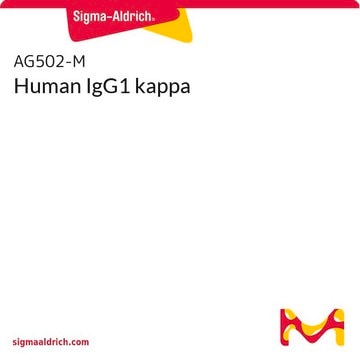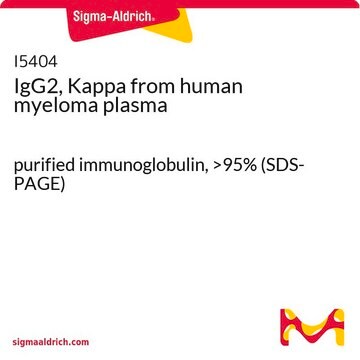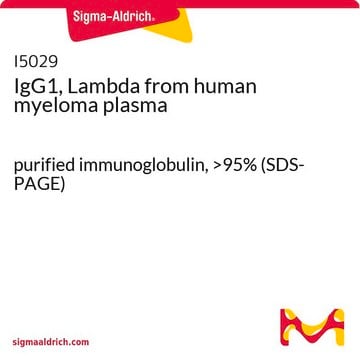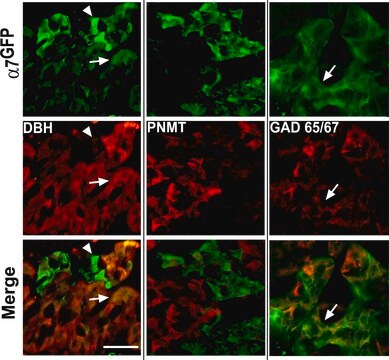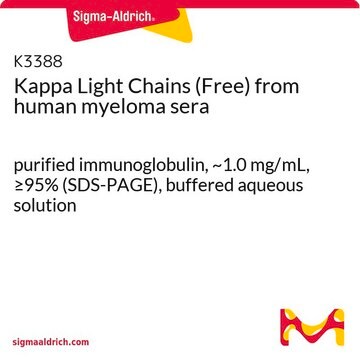I5154
IgG1, Kappa from human myeloma plasma
purified immunoglobulin, >95% (SDS-PAGE)
Synonym(s):
Human IgG1-κ
Sign Into View Organizational & Contract Pricing
All Photos(1)
About This Item
Recommended Products
biological source
human
Quality Level
conjugate
unconjugated
antibody form
purified immunoglobulin
Assay
>95% (SDS-PAGE)
application(s)
research pathology
shipped in
dry ice
storage temp.
−20°C
Looking for similar products? Visit Product Comparison Guide
General description
IgG antibody subtype is the most abundant serum immunoglobulins of the immune system. It is secreted by B cells and is found in blood and extracellular fluids and provides protection from infections caused by bacteria, fungi and viruses. Maternal IgG is transferred to fetus through the placenta that is vital for immune defence of the neonate against infections. IgG1 is the most abundant of the IgG subclass
Human myeloma IgG1, κ is purified from human plasma by fractionation, ion-exchange, and affinity chromatography procedures.
Human myeloma IgG1, κ is purified from human plasma by fractionation, ion-exchange, and affinity chromatography procedures.
Application
The purified IgG1, κ may be used as an immunoglobulin calibrator, reference antigen, blocking agent or coating protein in a variety of immunoassays including ELISA, dot-blot immunobinding, Western immunoblotting, immunodiffusion, immunoelectrophoresis, hemagglutination, and cell-binding assays. Human myeloma IgG1, κ was injected into mice (500 μg) to assess the T cell and B cell responses and also used for flow cytometry in CHO cells.
Physical form
Solution in 0.02 M Tris buffered saline, pH 8.0.
Analysis Note
Identity is determined by immunoelectrophoresis and indirect ELISA.
Disclaimer
Unless otherwise stated in our catalog or other company documentation accompanying the product(s), our products are intended for research use only and are not to be used for any other purpose, which includes but is not limited to, unauthorized commercial uses, in vitro diagnostic uses, ex vivo or in vivo therapeutic uses or any type of consumption or application to humans or animals.
Storage Class Code
10 - Combustible liquids
WGK
WGK 1
Flash Point(F)
Not applicable
Flash Point(C)
Not applicable
Choose from one of the most recent versions:
Already Own This Product?
Find documentation for the products that you have recently purchased in the Document Library.
Customers Also Viewed
Juan Manuel García-Martínez et al.
Molecular cancer therapeutics, 20(1), 96-108 (2020-10-11)
Activation of TRAILR2 has emerged as an important therapeutic concept in cancer treatment. TRAILR2 agonistic molecules have only had limited clinical success, to date, due either to lack of efficacy or hepatotoxicity. BI 905711 is a novel tetravalent bispecific antibody
J Sousa-Valente et al.
Osteoarthritis and cartilage, 26(1), 84-94 (2017-08-29)
Aiming to delineate novel neuro-immune mechanisms for NGF/TrkA signalling in osteoarthritis (OA) pain, we evaluated inflammatory changes in the knee joints following injection of monoiodoacetate (MIA) in mice carrying a TrkA receptor mutation (P782S; TrkA KI mice). In behavioural studies
Taehong Kwon et al.
Analytical chemistry, 92(7), 5267-5275 (2020-03-14)
We demonstrate a new micro/nanofluidic system for continuous and automatic monitoring of protein product size and quantity directly from the culture supernatant during a high-cell-concentration CHO cell perfusion culture. A microfluidic device enables clog-free cell retention for a bench-scale (350
Bor-Ching Sheu et al.
Biosensors & bioelectronics, 26(2), 822-827 (2010-07-09)
Emerging evidence indicates that the conformation of C-reactive protein (CRP) plays important roles in human inflammation and cardiovascular disease (CVD). The different conformations in the structure of CRP under different pH conditions remain an important issue to be investigated for
Yann Gallais et al.
Immunology and cell biology, 95(3), 306-315 (2016-10-08)
Patients treated with therapeutic biological products (BP) frequently develop anti-drug antibodies (ADA) with potential neutralizing capacities leading to loss of clinical response or serious side effects. BP aggregates have been suggested to promote immunogenicity, thus enhancing ADA production. Dendritic cells
Our team of scientists has experience in all areas of research including Life Science, Material Science, Chemical Synthesis, Chromatography, Analytical and many others.
Contact Technical Service
